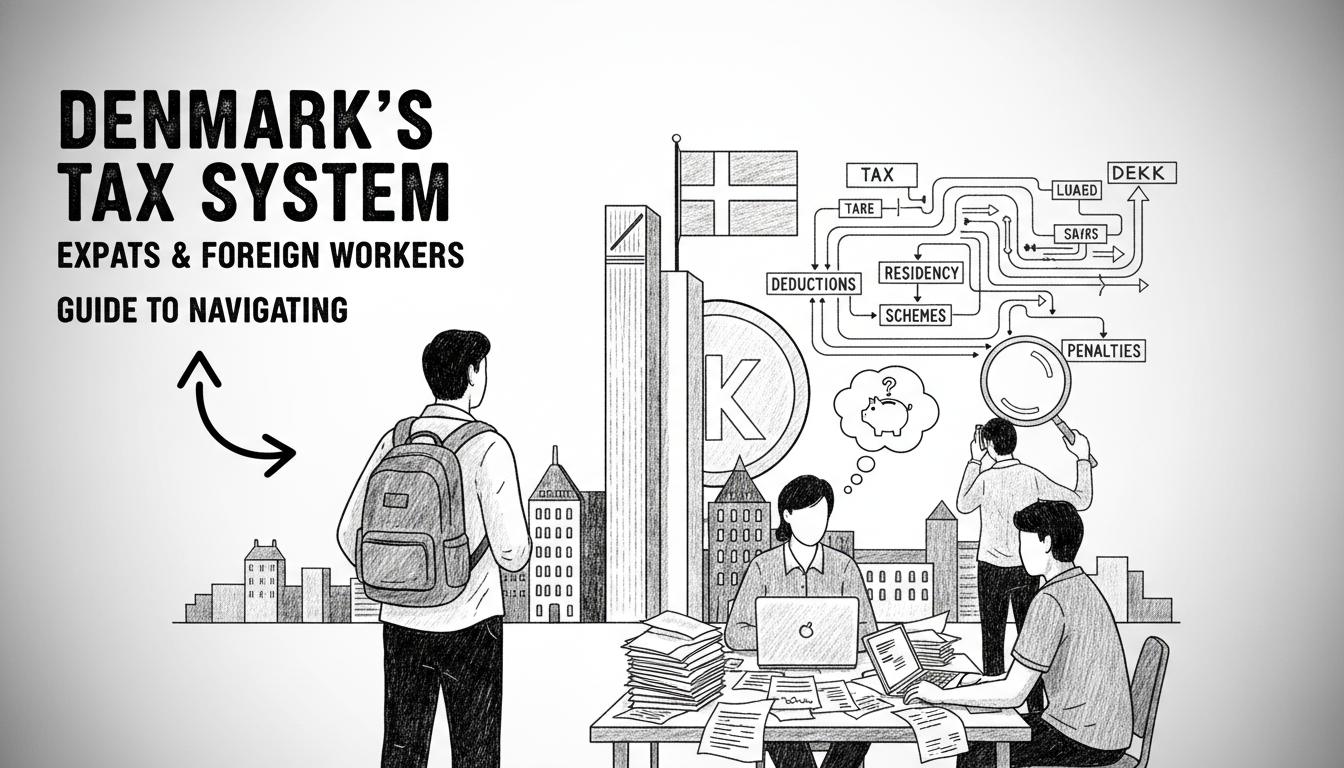When Maria Rodriguez moved from Madrid to Copenhagen for a tech job, her first Danish paycheck shocked her. The 52% tax rate seemed impossible. Yet three months later, she understood why Danes accept high taxes. They receive comprehensive services in return. This system confuses many newcomers. Understanding it early prevents costly mistakes.
Introduction to the Danish Tax System
Why Denmark's Taxes Matter for Expats
Denmark collects nearly half its GDP through taxes. This funds universal healthcare and free university education. High earners face marginal tax rates above 50%. Foreign workers must grasp this system quickly. Mistakes can lead to penalties or missed benefits. Proper planning saves thousands annually.
Key Principles of Danish Taxation
Danish taxes follow ability-to-pay principles. Progressive rates mean higher earners contribute more. The system emphasizes transparency and digital efficiency. All citizens access others' tax records online. This creates unusual social trust. The state provides extensive services in return for high contributions.
How the Danish Tax System Works
Overview of Tax Authorities and Processes
Skattestyrelsen, the Danish tax authority, runs everything digitally. Most foreigners interact through TastSelv, their online self-service portal. The system pre-fills tax returns with employer data. You simply verify or correct information. This automation makes filing straightforward for most employees.
Types of Taxes in Denmark
Denmark imposes multiple tax layers. Income tax includes labor market contributions and state taxes. A typical worker pays 8% labor market tax plus progressive income tax. VAT at 25% applies to most goods and services. Property taxes hit homeowners annually. Special taxes fund healthcare and education.
Tax Residency Rules for Expats
Residency depends on physical presence and family ties. Spending six consecutive months in Denmark usually creates tax liability. The 183-day rule applies to most foreigners. Breaking residency requires formal emigration procedures. Some expats qualify for special tax schemes during their first years.
Practical Steps for Expats to Handle Taxes
Registering for a Tax Card and CPR Number
Visit Borgerservice within two weeks of arrival. Bring passport, employment contract, and residence documentation. They issue your CPR number immediately. This personal registration number unlocks everything. Then apply for a tax card through Skattestyrelsen's portal. Your employer needs this card to calculate proper withholding.
Filing Your Tax Return
Access TastSelv using your NemID or MitID digital signature. The system pre-populates with employer-reported income. Verify all information matches your records. Add deductions for work expenses or charitable donations. Submit electronically before May 1st. Most refunds arrive within four weeks.
Deductions and Allowances You Can Claim
Commuting beyond 24 kilometers daily qualifies for deduction. Track these distances using Rejseplanen travel app. Professional union fees reduce taxable income. Membership in Danish Engineers Association costs 5,600 DKK annually. Home office expenses require detailed documentation. Charitable donations to registered organizations provide tax relief.
Special Considerations for Foreign Workers
Tax Treaties and Double Taxation Avoidance
Denmark maintains treaties with 85 countries. These prevent paying tax twice on the same income. American expats must still file US returns. They can exclude 120,000 USD of foreign earnings using FEIE. Consult with specialized firms like Accace for complex situations. Proper treaty application saves significant money.
The Researcher Tax Scheme and Other Benefits
Highly paid researchers and specialists qualify for flat 32% tax. This applies to earnings above 72,500 DKK monthly. The scheme lasts seven years. Companies like Novo Nordisk use this to attract international talent. Other workers can deduct relocation costs. This includes flights and initial accommodation expenses.
Handling Income from Abroad
Foreign rental income must be declared in Denmark. Tax treaties may provide credit for foreign taxes paid. Danish banks report foreign account holdings automatically. Failure to disclose overseas assets triggers severe penalties. Use Skattestyrelsen's guidance for specific country situations.
Common Challenges and How to Overcome Them
Avoiding Penalties and Late Filing Issues
Missing the May 1st deadline incurs automatic fines. These start at 1,000 DKK and increase monthly. Set calendar reminders for important tax dates. Use the E-tax app for mobile submissions. The system sends push notifications as deadlines approach.
Getting Help from Tax Advisors and Resources
International tax firms like KPMG offer expat packages. These cost 3,000-8,000 DKK depending on complexity. Skattestyrelsen provides free English-language guidance. Their international tax desk answers specific questions. Expat groups on Facebook share practical experiences.
Frequently Asked Questions
What is the average tax rate for a foreign worker earning 500,000 DKK?
A single person earning 500,000 DKK pays approximately 38% in total taxes. This includes labor market contributions and income tax. The effective rate varies with deductions and municipality.
Can I deduct costs for traveling back to my home country?
Travel costs for family visits are not deductible. Only business-related travel qualifies. Keep detailed records if your employer requires international work trips.
How long does it take to get a tax card after arriving?
Most applicants receive their tax card within ten business days. Delays occur if documentation is incomplete. Start the process immediately after receiving your CPR number.
Do I need to declare foreign bank accounts?
Yes. Denmark requires disclosure of all foreign accounts exceeding 10,000 EUR. Failure to report can result in penalties up to 200% of the tax due.
What happens if I leave Denmark mid-year?
You must file a final tax return. This covers income earned until your departure date. Skattestyrelsen issues a departure certificate confirming tax clearance.
Can I use tax software from my home country?
No. Only Danish-approved systems handle local tax rules correctly. Use TastSelv or consult with local tax professionals.
Are cryptocurrency gains taxable in Denmark?
Yes. All cryptocurrency profits are taxable as capital gains. The rate is typically 42% for amounts above 58,900 DKK annually.

